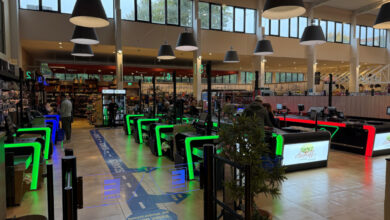Retailer apps pave the way to real-time loyalty

Retail companies today have unprecedented opportunities to use technology to bring their customers out of anonymity and to gain valuable data about individual purchasing behaviour. If retail companies succeed in consistently using customer data collected at various touchpoints, they create ideal conditions for completely transforming the way they do business and communicate with their customers. Retailers such as Aldi Nord, Lidl or Walmart’s cash & carry banner operation Sam’s Club are putting proprietary apps that run on customers’ smartphones at the centre of their loyalty strategies. When customers use services offered in retailer apps, such as discount coupons, recipe suggestions with matching shopping lists or self-scanning functions, retail companies can collect valuable shopper insights about their behaviour in physical stores. This opens up a wide range of previously untapped opportunities for retailers, not least the chance to provide customers with tailored offers in real time while they are shopping.
Geopolitical tensions, high inflation rates and new, extremely price-aggressive online platforms such as Temu and Shein, which can ship a large proportion of their products below the duty-free limit in direct sales from China to the US or European countries, in a way that distorts competition, are reshuffling the cards in the retail landscape. In an increasingly complex economic environment, it is becoming more and more important for retailers to get to know their customers better, to encourage them to shop more often and on a larger scale through their banner operations by addressing them in a more personalised way.
More and more retail companies are currently modernising their outdated loyalty programmes. Many retailers who did not even have one are now investing in the development of their own customer loyalty scheme, motivated by completely new technological capabilities. Others are leaving joint loyalty schemes with other retail companies and setting up their own. “The best way for retail companies to survive in the long run is through good customer retention,” explains Dr Kai Hudetz, managing director of the Institute for Trade Research (IFH Köln) in an in-depth interview with The Retail Optimiser.
Intelligent loyalty strategies can play a decisive role in paving the way for retail companies to profitably lead their business across all distribution channels into a profitable future. “Customer loyalty programmes are not an outdated approach, they are currently experiencing a renaissance as retailers are increasingly looking for reliable customer data,” explains Falko May, principal at Capgemini, responsible for the customer loyalty management division, in an interview with The Retail Optimiser. “Loyalty programmes are therefore often the first choice, as they are tangible, effective and essential for success in retail.”
Buying propensity falls worldwide
According to consumer trend study GfK Consumer Life, which is based on POS data collected annually by retail panels in over 70 countries, a high rate of inflation unsettles consumers. As a result, shoppers become more price sensitive and the climate for consumption stagnates. In the current study ‘What Matters to Today’s Consumer 2024’ by the consulting and services company Capgemini, 52 per cent of consumers state that they are very concerned about their personal finances. 40 per cent of those surveyed plan to reduce their spending in various product categories. According to Capgemini’s study, retail customers are most likely to cut back on luxury items and furniture, but also on over-the-counter healthcare products and food.
This year’s Consumer Trends Study by Capgemini also revealed that, in the tense economic situation, consumers are particularly keen to buy from companies that are helping them to overcome the crisis. “At a time when markets are saturated and customers are price-conscious, it is important to provide the right buying impetus,” explains Dr Kai Hudetz, Managing Director of IFH Köln. “Customers are difficult to encourage to make spontaneous purchases, which is why discounts play an important role in the marketing mix. Today, it is essential to consider discounts as part of the strategy.”
Capgemini’s Falko May sees enormous potential for food and fashion discounters: “In difficult economic times, it represents a significant opportunity for retail companies to show customers that their fears and needs are understood. For food and fashion discounters in particular, this is an opportunity to tap into new target groups. Furthermore, it is of course important to retain them in the long term.”
Emotional connection instead of chasing discounts
If a retail company only offers standardised discount promotions for all customers or purely transactional, little personalised earn-and-burn programmes, in which it rewards its customers for purchases made, this may have the potential to boost sales in short term, but it does not necessarily create a long-term connection to the brand. “We then ultimately subject the consumer to constant incentives and end up with what we can see in the furniture retail sector in Germany: brochures overflowing with cascading discounts,” says Dr Kai Hudetz, adding: “This is not very trustworthy. For retail companies, it makes much more sense to work with targeted offers and not to enter into a discount battle on – almost – everything.”
Many decision-makers in retail have realised that price discounts should not be the only lever in the relationship between retail companies and customers. “Promising loyalty programmes not only offer customers financial incentives, but also create an emotional bond with a brand by giving shoppers a sense of belonging and recognition,” explains Falko May of Capgemini. “Appreciative gestures such as personal invitations to pre-sales events can be a crucial element in creating an emotional bond with customers and adding value that goes beyond the financial aspect.”

Retailers not only rewards purchases
Smart loyalty programmes from retail companies not only honour purchases made by their customers, but also their upstream or downstream interactions with the company. Retailers can thus reward their existing and potential new customers when they provide feedback on the retailer’s products or services, submit product reviews, make recommendations to friends or become active on the company’s own social media platforms. In this way, retail companies give their customers more incentives to contribute their valuable feedback.
If retail companies draw the right conclusions from their customers’ feedback and consistently integrate it into their business processes, they can continuously optimise their products and services. Nicole Smuga, Loyalty Marketing Consultant for Enterprise Loyalty Programmes at consulting company Comarch, which has made a name for itself by regularly conducting shopper studies, explains: “Programme operators need to move away from a pure consumer focus towards a mindful approach to handling data and resources as well as regular and relevant 1:1 interaction.”
Balancing shopping experience and profitability
Even in countries where loyalty programmes are established almost industry-wide – in the USA alone, over three billion members are registered in loyalty schemes – they aren’t a sure-fire success. This is because retail companies have to manage their loyalty activities in such a way that they offer their customers an appreciative shopping experience that is in line with the retail company’s brand essence, while still being economically efficient.
“The key is finding the right balance between monetary and non-financial benefits,” explains Falko May to The Retail Optimiser. “By offering their customers emotional added value, retailers not only increase their customer lifetime value, but also create long-term loyalty, while everything else is often just a tactical, short-term solution.”
Customers are data-savvy
For retail companies, especially those that offer everyday goods, it is not only the current tense economic situation of many shoppers that can become a problem, but also the nature of their consumer behaviour: today’s customers are constantly online, easily comparing prices for products and services, using review portals and exchanging information with other consumers about their experiences with companies and products. One consequence is that informed customers expect more service at a lower price.
Customers are switching between retailers and their various distribution channels more easily than ever before. “We see that loyalty to companies in the consumer goods industry is basically decreasing,” explains Dr Kai Hudetz, Managing Director of IFH Köln, adding: “Today’s customers have many more purchasing options and use price transparency on the internet by constantly making comparisons.”

360-degree view of the customer
In challenging times, it is even more important for retail companies to score points with their customers by providing a seamless shopping experience. While the desire among retail companies to gain a unified view of their customers’ behavioural data is not new, it remains highly relevant. For a complete 360-degree customer view, actions at various touchpoints along the customer journey must be collected, structured and merged into a customer profile. However, this is and remains a huge effort for retail companies.
Customer data is often stored and processed by retail companies in many different data pools and systems – CRM, marketing and service solutions. In many cases, customer data from brick-and-mortar stores and online banner operations are also kept separate. In order to gain a holistic view of the customer and provide a fluid shopping experience, companies need a strategy that consolidates and connects data and processes.
“Most companies struggle to overcome their silo structures in order to utilise a comprehensive dataset for every customer,” explains Capgemini’s Falko May, adding: “Only a few companies have actually implemented a 360-degree customer data architecture. Established structures as well as organisational and technical limitations make it difficult to achieve this goal in many cases.”
Transparency in data protection is important
In order to be able to utilise this data treasure, it is important for retail companies to be transparent about how customer data is used and how it is protected against unauthorised access. Despite all efforts, harmful attacks on the data pools of retail companies are not diminishing. “It is important that companies are transparent with their customers about what happens to their data in order to build trust,” explains Falko May of Capgemini.
IFH Köln’s managing director Dr Kai Hudetz sees a strategic advantage in data collection for those retail companies that have been on the market for a long time: “Customers are willing to share a lot of personal data if they recognise clear added value. At the same time, they are exposed to the potential misuse of this data on a daily basis, and companies need to be aware of this. Those retail brands that have been able to build trust over decades have strategic advantages in obtaining more data than completely new players in the market.”

Lidl is leveraging the treasury of data from its physical stores
Following the example of their e-commerce distribution channels, numerous retail companies are now working on bringing customers of their physical stores out of anonymity. Lidl, for example, launched a digital customer loyalty programme in 2020 to collect valuable customer data for marketing purposes. Lidl analyses insights gained via its customer app on a large scale in order to offer shoppers personalised offers and services in its German stores as well as those outside its home country.
Europe’s largest retail banner operation has thus taken a major step forward in customer-based shopping basket analysis. To motivate customers to use the Lidl Plus app, Schwarz Group’s banner operation offers exclusive discounts and personalised offers exclusively via its app. So far, this behaviour was previously unusual for discounters.
Aldi Nord tests loyalty scheme in Belgium
Aldi Nord is following in the footsteps of its competitor Lidl and has been testing a customer loyalty scheme for the first time in parts of Belgium since July 2024. Users of the Aldi app can collect bonus points in around 70 of its stores in West Flanders and the north of the province of Hainaut. If a customer has added certain branded items to their shopping list, the Aldi app suggests replacing them with corresponding own brands. Its Swap and Save function then shows how much less the Aldi product costs in per cent. Aldi Nord’s app is not yet linked to the self-scanning solutions that the discounter is testing in the Netherlands.
As reported by Lebensmittel Zeitung, Aldi Nord is working on this loyalty scheme with software specialist GK, which is also developing the discounter’s new store solutions. At this year’s Eurocis, GK presented its new AI-enhanced loyalty solution ‘GK Engage’.

AI tools enable hyper-personalised customer experiences
Customer surveys show that shoppers expect personalised offers. For example, 69 per cent of consumers surveyed by Deloitte and Medallia via an international panel of 7,000 shoppers in France, the USA, Poland, Germany, Hungary and the Czech Republic believe that a personalised experience has a positive influence on their loyalty.
If retail companies want to offer their customers tailored rewards as part of loyalty schemes, they use AI tools to leverage large amounts of customer insights, which consist of thousands of data points from current and historical customer behaviour.
“Retail companies that deploy AI tools can make much more efficient use of their customer data and target shoppers,” explains Dr Kai Hudetz, Managing Director of IFH Köln. “AI-based data analysis allows retail companies to predict how their customers will react to various promotions. For example, it can be analysed whether someone will respond to a 10 per cent discount or whether they will only become active at 30 per cent.”
Loyalty managers gain full control
AI tools can help retail companies to create precise recommendations for offers, personalised coupons, behaviour-based rewards and promotions that are tailored to the interests of the recipients. Depending on the company’s objectives, loyalty managers can maintain full control over which content is delivered to which target group. Or they can set goals that the AI then implements independently by selecting the right offers via the appropriate channels based on customer behaviour in real time and making them available on a customer-specific basis.
Falko May from Capgemini also sees enormous potential in how corporate processes can be optimised using AI: “There are hardly any retail companies that are not looking at how they can use AI and Gen-AI. There are also exciting fields of application for companies in processes such as customer segmentation or knowledge transfer for customer service employees.”
However, Dr Kai Hudetz also emphasises the risks for companies when using AI tools: “AI is not error-free and is in a constant process of development. Algorithms can present incorrect information or correlations, which leads to inaccurate offers. The risk remains, regardless of how good the quality of the data and the mechanisms behind it are that feed the AI.”

Tesco relies on hyper-personalisation
Tesco, for example, uses an AI-based data science solution in its customer loyalty scheme. The solution’s algorithms enable the British retail giant to gain a holistic view of each shopper. Tesco is able to evaluate large volumes of data on customer usage behaviour in a structured approach – at every touchpoint in store or online shop.
Based on the findings, the solution creates hyper-personalised content, recommendations and offers and displays them to individual customers in real time. Tesco can use this tool to drive cross-selling and upselling activities more easily on site in the app or at self-checkout in its physical stores.
Sam’s Club utilises display ads in real time during self-scanning
Walmart’s cash & carry banner operation Sam’s Club is leading the way in targeting customers with personalised content via its app every time they scan a product while being in a physical store. “An approach that only starts at the checkout in brick & mortar stores is simply too late in today’s world and neglects the diverse needs of customers and does not take the entire ‘customer journey’ into account,” explains Capgemini’s Falko May.
Sam’s Club brings display ads from consumer goods industry into the Scan & Go function of its membership app. The US retail company is thus opening up new opportunities for advertisers to reach their customers in physical stores at that point in the customer journey when they ultimately decide to purchase products. This opens up new opportunities for Sam’s Club to measure its customers’ purchasing behaviour and advertising performance.
Retailers want to get existing loyalty programmes in shape
The loyalty market is on the move: study results show that three out of four operators of loyalty programmes will revise or redesign them in the next three years in order to be able to seamlessly address customers with personalised offers across all touchpoints. Retail companies need flexible IT solutions to quickly adapt to changing customer needs without having to undertake costly or time-consuming remodelling of systems.
When restructuring their loyalty programmes, retailers aim to ensure that all implicit and explicit customer-relevant information is recorded centrally on one platform in real time or can be integrated by third-party systems – across all distribution channels.
Realtime reaction to shoppers’ wishes
AI-based tools can be used to deliver relevant messages to the right person at the right time and in the right place. New technologies offer retail companies the opportunity to quickly recognise customers’ needs and create a seamless customer experience across all channels. This creates long-term customer loyalty.
“In a digitalised world where change is the new normal, unconditional customer centricity and adaptability are important keys to success,” explains Oliver Schmitz, retail trends expert at NIQ and GfK. “Retailers who set up their strategy based on data and constantly adapt it will be better positioned to meet the ever-changing demands of consumers. This is how retailers ensure long-term success.”




